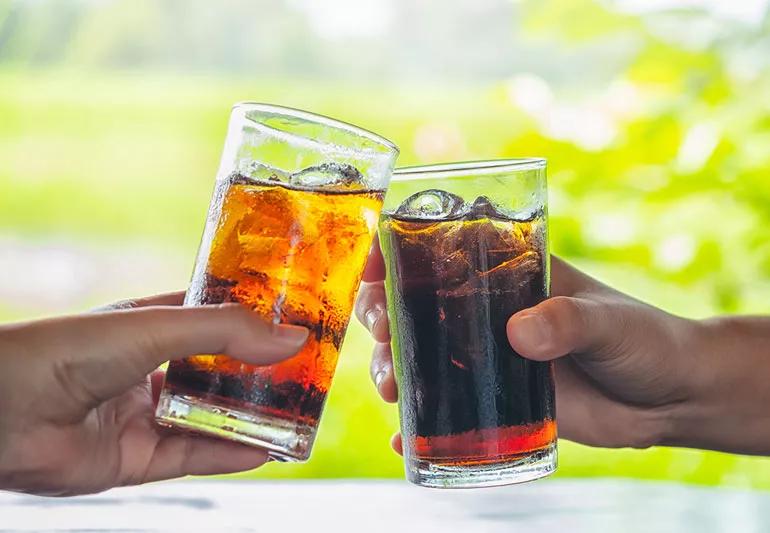These ‘no-calorie’ drinks are linked to poor health

Image content: This image is available to view online.
View image online (https://assets.clevelandclinic.org/transform/7a2a0299-a53d-4237-bdd5-2707a35dda67/sodaJuiceUnhealthy-1060532452-770x553_jpg)
Two glasses of soda on a bright background
In an effort to cut back on sugar, many adults reach for sugar substitutes, in the hopes they’ll be a little healthier. But, according to a recent study, artificial sweeteners can actually increase our health risks.
Advertisement
Cleveland Clinic is a non-profit academic medical center. Advertising on our site helps support our mission. We do not endorse non-Cleveland Clinic products or services. Policy
“Whether you are choosing something that has real sugar, artificial sweeteners or even a plant-based sweetener that has no calories – it’s still turning on the center of your brain and training you to want more sweet things,” says Lindsay Malone, RD, who did not take part in the study.
The study looked at data on 81,714 women between the ages of 50 and 79.
Researchers found that drinking artificially sweetened beverages was associated with an increased risk of stroke, heart disease and even death.
Women who drank two or more diet drinks a day had a 23% increase in stroke risk when compared with women who drank diet drinks less than once per week.
Malone says artificial sweeteners change our gut bacteria, among other things.
Sugar, in general, promotes an increase in your personal blood sugar, as well as spikes in insulin. All of these things combined can contribute to excess weight gain ― particularly fat, and also inflammation.
It’s also important to keep in mind that artificial sweeteners tend to be hundreds of times sweeter than regular sugar, Malone notes.
Consuming artificial sweeteners sets the bar really high for your palate, and encourages your taste buds to keep going for something sweeter and sweeter each time.
Malone says a good way to gauge whether your diet is too sweet is to see if fruits like apples and strawberries taste sweet to you.
If the answer is ‘no,’ you should work on lowering the ‘sweet threshold’ of your palate. “Work on cutting in half what you’re doing right now and continue to cut it in half until you’re not using any sweeteners,” she says. “Consider limiting your sugar to just on a special occasion, or in a baked good enjoyed in moderation.”
Advertisement
Advertisement

Delivered every Tuesday!
Sign up for our Health Essentials emails for expert guidance on nutrition, fitness, sleep, skin care and more
It's a letter about the news!
Learn more about our editorial process.
Advertisement
Your age, the type of stroke you had, the cause and the location can all impact your recovery
It can be overwhelming, but habit changes help lower your risk of another stroke
The short answer from a cerebrovascular expert
Act fast: Your risk for recurrent stroke is highest just after your first stroke
A good support system can help ease your transition
First study of deep brain stimulation in stroke survivors
Lorem ipsum dolor sit amet. Et odio Quis vel ipsam omnis eum alias deleniti et placeat impedit non voluptas galisum hic autem enim et cupiditate aliquid. Est beatae quidem non facilis autem ut commodi nisi aut tempore rerum et dolores voluptatem cum enim optio id sapiente quasi. Ad laboriosam officiis 33 cupiditate sequi ea voluptatum consectetur qui necessitatibus voluptate et quasi doloremque et facere explicabo quo explicabo officia
You can counter the risk of prediabetes-related heart attack or stroke by eating more fruits, vegetables and whole grains, as well as exercising regularly
Type 2 diabetes isn’t inevitable with these dietary changes
Applying a hot or cold compress can help with pain
Pump up your iron intake with foods like tuna, tofu and turkey